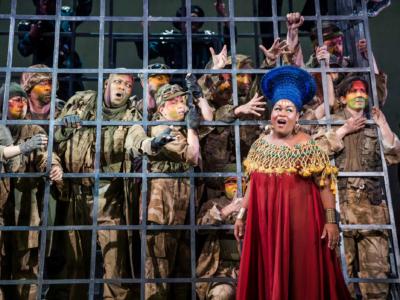Discover Don Carlos
Don Carlos, composed by Giuseppe Verdi, is a powerful narrative set against the backdrop of 16th-century Spain, exploring themes of political intrigue, forbidden love, and personal sacrifice.The Don Carlos opera libretto was originally written in the French language. Premiering in 1867 at the Paris Opéra, Don Carlos is based on Friedrich Schiller’s play Don Carlos, Infant von Spanien.
In summary, the opera Don Carlos revolves around the turbulent relationship between Don Carlos, the Spanish Prince, and his father, King Philip II, complicated by their mutual love for Elisabeth of Valois. Elisabeth, once betrothed to Don Carlos, becomes Philip’s queen, igniting a web of passion, jealousy, and rebellion.
The opera is renowned for its rich orchestration, dramatic arias, and complex characters, making it a staple in the operatic repertoire. Verdi’s Don Carlos continues to captivate audiences worldwide, reflecting timeless human conflicts and the quest for freedom and justice. Don Carlos has the longest length of any of any opera written by Verdi; in it’s original form it can run for between four and five hours.
Don Carlos Synopsis
Act 1:
In the forest of Fontainebleau, amidst a harsh winter, Don Carlos, the Prince of Asturias, meets Elisabeth of Valois. They fall in love instantly (“Io la vidi” / “Je l’ai vue”). Their happiness is short-lived as Elisabeth is informed that she must marry King Philip II of Spain, Carlos’s father, to seal a peace treaty between their countries. Though heartbroken, Elisabeth agrees to the marriage out of duty (“La pace mia smarrita” / “Ma première amie”).
Act 2:
In the cloister of the monastery of San Yuste, Carlos prays for solace. He is visited by his friend Rodrigo, the Marquis of Posa, who encourages him to support the oppressed people of Flanders. Rodrigo pledges to help Carlos in his quest for personal and political freedom (“Restate!” / “Ah, je meurs l’âme joyeuse”). At the palace in Madrid, King Philip and Elisabeth are seen in a strained relationship. Carlos confronts Elisabeth and declares his love for her, but she rebuffs him, reminding him of her loyalty to the king (“Perduta ho la pace” / “Dites-lui que je l’aime”).
Act 3:
During a public celebration and auto-da-fé in front of the cathedral of Valladolid, Carlos demands that King Philip grant freedom to the people of Flanders. Philip denies the request and orders Carlos’s arrest. In a heated exchange, Rodrigo steps in to defend Carlos, earning Philip’s trust. The act ends with the execution of heretics, underscoring the brutal power of the Inquisition (“Spuntato ecco il dì d’esultanza” / “L’infant Carlos, notre espérance”).
Act 4:
In King Philip’s study, the king laments his loveless marriage and seeks advice from the Grand Inquisitor, who insists that both Carlos and Rodrigo must die to maintain the power of the throne and the Church (“Ella giammai m’amò” / “Elle ne m’aime pas”). Rodrigo visits Carlos in prison, revealing his plan to sacrifice himself for his friend’s freedom (“Per me giunto è il dì supremo” / “Vous qui fléchissez”). As Rodrigo is killed by Philip’s guards, he hands Carlos a letter from Elisabeth, arranging a final meeting at the monastery.
Act 5:
In the monastery of San Yuste, Elisabeth prays for peace and strength (“Tu che le vanità” / “Toi qui sus le néant”). She meets Carlos and urges him to continue his fight for Flanders. Their farewell is interrupted by King Philip and the Grand Inquisitor, who come to arrest Carlos. As the confrontation reaches its peak, the ghost of Emperor Charles V appears, drawing Carlos into the cloister, symbolising his escape from earthly struggles and the oppressive forces around him. The opera ends with a powerful assertion of divine intervention and eternal peace.
Frequently asked questions about Don Carlos
How long is Don Carlos the opera?
A performance of Don Carlos is varies from roughly 3 hrs 50 mins to 4 hrs 30 mins, with one interval.
Who is Don Carlos?
Don Carlos is the main character in Guiseppe Verdi’s epic opera of the same name. The persona is based on the real-life Prince of Asturias, the eldest son of King Philip II of Spain.
Is Don Carlos the longest opera?
The opera is the longest composition by Verdi, and is over 4 and a half hours long when performed in its original form.
What is the story of the opera Don Carlos?
The storyline follows the love and conflicts of Don Carlos, a prince promised to Elizabeth of Valois. However, in a heartbreaking turn of events, a peace treaty is agreed where Elizabeth is demanded to marry Don Carlos’s father, Philip II of Spain. A tale of treasonous love and danger follows as Carlos and Elizabeth try to keep their affections a secret and betray the king.

